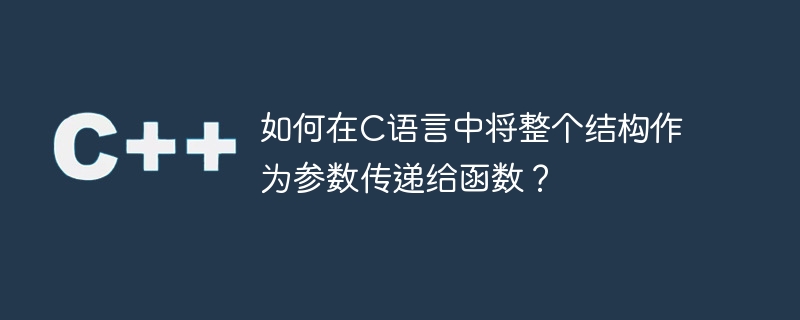

There are three ways to pass the value of a structure from one function to another. They look like this:
Pass a single member as a parameter to a function.
Pass the entire structure as a parameter to the function.
Pass the address of the structure as a parameter to the function.
Now let’s see how to pass the entire structure as a parameter to a function.
Give the names of structure variables as arguments in function calls.
Collect it into another structure variable in the function header.
The disadvantage is that it wastes memory and creates a copy of the entire structure again.
The following program demonstrates how to pass an entire structure as a parameter to a function.
Demonstration
#include<stdio.h>
struct date{
int day;
char month[10];
int year;
};
int main(){
struct date d;
printf("enter the day,month and year:");
scanf("%d%s%d",&d.day,d.month,&d.year);
display(d);//passing entire structure as an argument to function
return 0;
}
void display(struct date d){
printf("day=%d</p><p>",d.day);
printf("month=%s</p><p>",d.month);
printf("year=%d</p><p>",d.year);
}When the above program is executed, it produces the following results −
enter the day, month and year:18 JAN 2021 day=18 month=JAN year=2021
Consider another An example, in this case, explains how a C program can pass an entire structure as a parameter to a function.
Online Demonstration
#include<stdio.h>
//Declaring structure//
struct add{
int var1;
int var2;
}a;
//Declaring and returning Function//
void show(struct add a){
//Declaring sum variable//
int sum;
//Arithmetic Operation//
sum=a.var1+a.var2;
//Printing O/p//
printf("Added value is %d",sum);
}
void main(){
//Declaring structure//
struct add a;
//Reading User I/p//
printf("Enter variable 1 = ");
scanf("%d",&a.var1);
printf("Enter variable 2 = ");
scanf("%d",&a.var2);
//Calling function//
show(a);
}When the above program is executed, it produces the following results −
Enter variable 1 = 20 Enter variable 2 = 50 Added value is 70
This is another C program that demonstrates passing an entire structure as a parameter to a function. It explains things like declaring structures, declaring and returning functions, etc.
Online Demonstration
#include<stdio.h>
//Declaring structure//
struct student{
int s1,s2,s3;
}s[5];
//Declaring and returning Function//
void addition(struct student s[]){
//Declaring sum variable and For loop variable//
int i,sum;
//Arithmetic Operation//
for(i=1;i<4;i++){
sum=s[i].s1+s[i].s2+s[i].s3;
printf("Student %d scored total of %d</p><p>",i,sum);
}
}
void main(){
//Declaring variable for For loop//
int i;
//Reading User I/p through For loop//
for(i=1;i<4;i++){
printf("Enter marks for student %d in subject 1 = ",i);
scanf("%d",&s[i].s1);
printf("Enter marks for student %d in subject 2 = ",i);
scanf("%d",&s[i].s2);
printf("Enter marks for student %d in subject 3 = ",i);
scanf("%d",&s[i].s3);
}
//Calling function//
addition(s);
}When the above program is executed, it produces the following results −
Enter marks for student 1 in subject 1 = 25 Enter marks for student 1 in subject 2 = 89 Enter marks for student 1 in subject 3 = 45 Enter marks for student 2 in subject 1 = 12 Enter marks for student 2 in subject 2 = 45 Enter marks for student 2 in subject 3 = 89 Enter marks for student 3 in subject 1 = 12 Enter marks for student 3 in subject 2 = 78 Enter marks for student 3 in subject 3 = 12 Student 1 scored total of 159 Student 2 scored total of 146 Student 3 scored total of 102
The above is the detailed content of How to pass entire structure as parameter to function in C language?. For more information, please follow other related articles on the PHP Chinese website!




